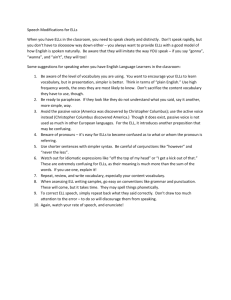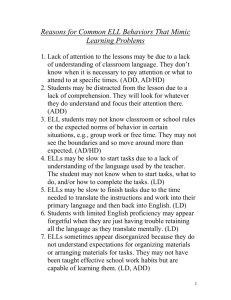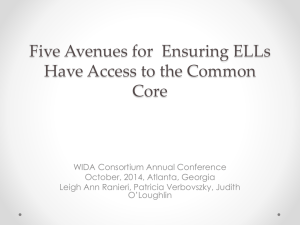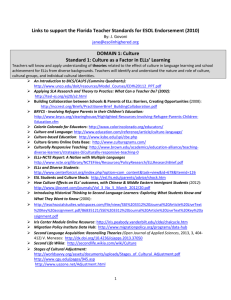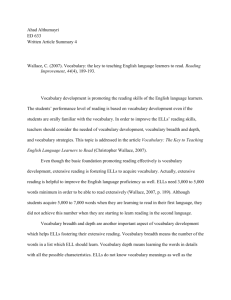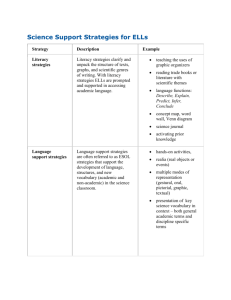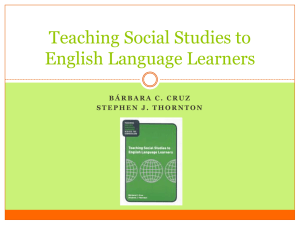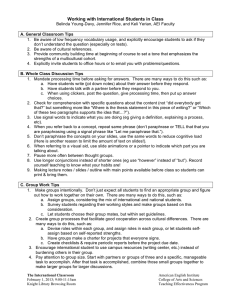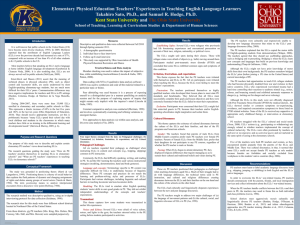File
advertisement
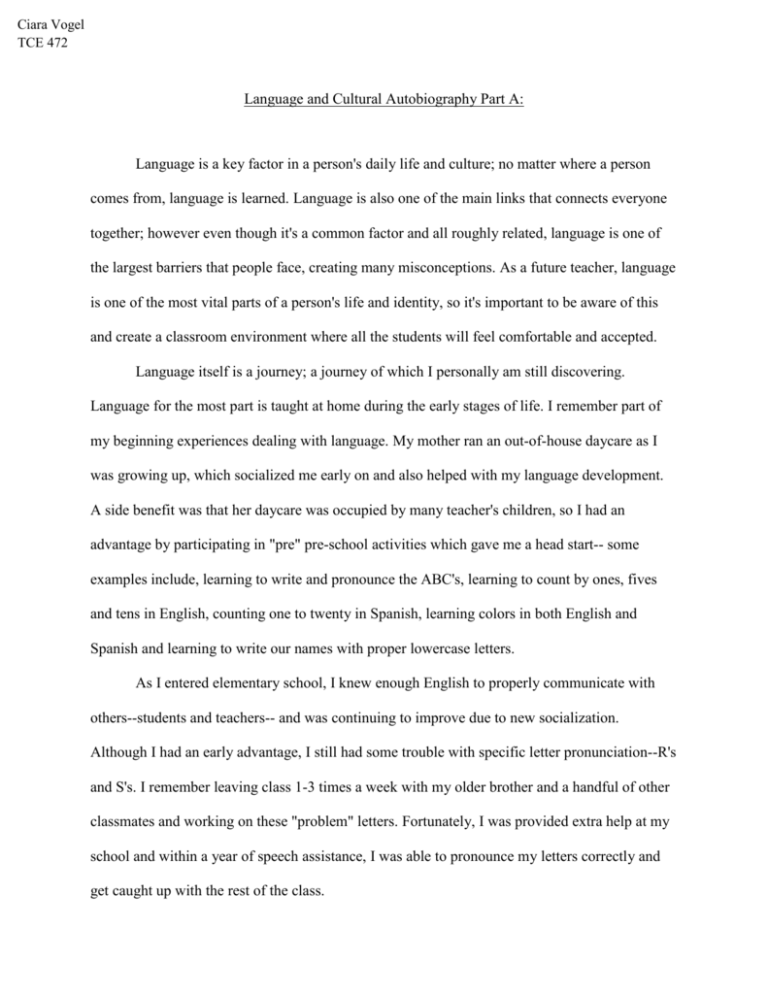
Ciara Vogel TCE 472 Language and Cultural Autobiography Part A: Language is a key factor in a person's daily life and culture; no matter where a person comes from, language is learned. Language is also one of the main links that connects everyone together; however even though it's a common factor and all roughly related, language is one of the largest barriers that people face, creating many misconceptions. As a future teacher, language is one of the most vital parts of a person's life and identity, so it's important to be aware of this and create a classroom environment where all the students will feel comfortable and accepted. Language itself is a journey; a journey of which I personally am still discovering. Language for the most part is taught at home during the early stages of life. I remember part of my beginning experiences dealing with language. My mother ran an out-of-house daycare as I was growing up, which socialized me early on and also helped with my language development. A side benefit was that her daycare was occupied by many teacher's children, so I had an advantage by participating in "pre" pre-school activities which gave me a head start-- some examples include, learning to write and pronounce the ABC's, learning to count by ones, fives and tens in English, counting one to twenty in Spanish, learning colors in both English and Spanish and learning to write our names with proper lowercase letters. As I entered elementary school, I knew enough English to properly communicate with others--students and teachers-- and was continuing to improve due to new socialization. Although I had an early advantage, I still had some trouble with specific letter pronunciation--R's and S's. I remember leaving class 1-3 times a week with my older brother and a handful of other classmates and working on these "problem" letters. Fortunately, I was provided extra help at my school and within a year of speech assistance, I was able to pronounce my letters correctly and get caught up with the rest of the class. One thing that's interesting about language is that once something is learned, it's often times hard to fully forget; for example, my mother was born and raised in Fairview-- on the border, so she attended school in Montana but her farm was in North Dakota-- and up there certain words are spoken differently. Since she was the first major influence on my exposure to language I say a few things with the same execution found in the dialect of where she was raised. For example, I say my A's softly instead of the normal harsh A of which my father was raised-- I say Aunt with an "aw" sound instead of Aunt like "ant." Although English is my first language, I know the struggles of learning a new language. As early as 5th grade, I was interested in learning more about my heritage and the different cultures. My German ancestry in particular intrigued me. My father rarely talked about his family life, however I knew that my grandfather--whom I never met-- was from Germany and that my last name, Vogel, means "bird" in German. Maybe the fact that I knew so little about my dad's side interested me, I'm not sure, but it established the "need" to learn. I remember looking up words and checking out German library books all to help teach me the language. I don't remember much about the language itself--although I could speak a few sentences in the native tongue-- mostly due to the lack of the language's presence in my life. Aside from the materials I found to help me learn, the German language wasn't present or common anywhere I went and the lack of exposure ultimately overcame the desire to speak it. It wouldn't be another four years until I attempted to learn another language. My freshman year of high school, I took my first French class. I remember how tedious the work was and the struggles of correct pronunciation. In an academic environment, the language is broken down into sections and proper grammar--all which have very different rules than English, making it difficult for me. The process of learning French was very structured and formal; there was loads of paperwork and assignments, which created a lot of anxiety and stress-- especially when preparing for an oral presentation-- because I hardly knew the language. I took French for four years-- French I to AP French-- and regardless of my growth and advancement in the language, I still felt alone at times. When I was stuck with a particular word problem or grammar homework assignment, I would be at a loss because I couldn't get any help from my family or friends-- because they didn't know the language. Although English is my first language, having been given the opportunities to learn new languages has given me a glimpse of daily life for many ELLs. Having gone through the struggle and new experiences myself will definitely be beneficial when teaching ELLs. With my own personal comprehension and exposure to the process, I, as a future teacher, will have a new perspective and understanding of how to best approach these students in a way to help them feel less "lost" within a new classroom and culture. For many ELLs, it's expected of them to be at or near the same level as the native speakers when they fist are enrolled in school. When considering all of the factors that apply-such as parent involvement and prior English exposure-- this expectation is unreasonable. Having been expected of this myself, I know firsthand that learning another language is hard work and takes time. I was fortunate enough to have been older--with a wide range of vocabulary and understanding of the process of language-- when I was taught French, I can't begin to imagine meeting new language requirements without necessarily even knowing it all in my own native tongue at a young age. As previously experienced, learning languages focuses more grammar, which is an idea that was mentioned in the article "Teaching Standard English: Whose Standard?" where the English language, focuses more on the structure and grammar rather than content-- which would be more effective if reversed-- when teaching ELLs (Christensen, 1990). Correlating to this idea, many ELLs come from backgrounds with parents who only speak little to no English and lack in formal education, yet believe in the importance of education for their child to succeed, which is difficult due to lack of ELLs program support and resources and misconceptions due to the language barrier. When a new language is being taught based off of grammar and structure, the opportunities to use the content and practice the language becomes limited, making the process for ELLs more difficult than necessary (Freeman & Freeman, 2011). As the increase of ELLs continues, there needs to be new ways to support these students. Works Cited Christensen, L. M. (1990). Teaching Standard English: Whose Standard? English Journal, 36-40. Freeman, D. E., & Freeman, Y. S. (2011). Between Worlds: Access to Second Language Acquistion. Portsmouth, NH: Heinemann.

